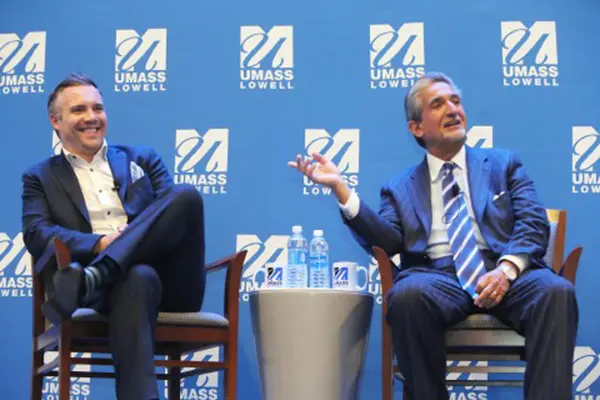 Image by Lowell Sun/Julia Malakie
Image by Lowell Sun/Julia Malakie
12/16/2017
Lowell Sun
By Aaron Curtis
LOWELL -- It was a win for the little guy.
In a nation of corporate juggernauts, it's hard to believe it could have happened at all.
The one-of-a-kind story is that of the six-week boycott of the local grocery chain Market Basket by thousands of employees and millions of customers in 2014 that led to the reinstatement of fired CEO Arthur T. Demoulas.
It was a story captured by Nick Buzzell and Ted Leonsis, the producers of the film "We the People: The Market Basket Effect." The documentary was shown at UMass Lowell's Moloney Hall on Wednesday night, presented by the school's Donahue Center for Business Ethics and Social Responsibility.
"At the end of the day, we didn't know how this movie was going to end," said Buzzell, who pointed out that everyone involved in the movie's production had somehow been involved with Market Basket at some point in their lives.
"It could have been a great happy ending, which thankfully it was, or it could have been an incredible Greek tragedy," Buzzell added.
Market Basket began as a food store that opened in the Acre section of Lowell in 1917 by Greek immigrants who came to the U.S. in pursuit of the American dream. The grocery chain, which stayed all in the family, now operates nearly 80 stores across New England.
A family feud within the chain unfolded in the 1990s involving ownership rights and differences of opinions that led to lawsuits and accusations.
The family turmoil held firm years later despite the success and growth that included billions of dollars in revenue at the independent grocery chain.
In 2008, Arthur T. Demoulas was named CEO. Success blossomed under his leadership. After being brought in as CEO until 2013, Market Basket increased sales by one-third, added roughly 8,000 employees and maintained one of the highest profit margins in the industry, company finance officials said at the time.
And, despite having some of the lowest prices in town, Market Basket was able to provide an acceptable wage for employees, bonuses and a retirement plan, among other benefits.
Conflict arose within the chain again in 2013. In court filings, Arthur S. Demoulas, Arthur T.'s cousin, and a shareholder, led a charge against the CEO accusing him of reckless spending.
In June 2014, Arthur T. was fired despite an outcry from the company's employees and customers. A pair of replacement CEOs were brought in and the culture of the store under Arthur T. seemed to be disappearing.
The move led to "a little revolution," as described in the film. Customers and employees of the chain revolted, staging protests that included a sea of Arthur T. supporters popping up all over New England. In the movie they could be seen holding signs stating, "Don't Feed the Greed," and "You can't fire me, I quit."
Many employees stopped going to work at the chain and the majority of customers stopped shopping and at the store, demanding they wouldn't return until Arthur T. was reinstated.
It was a story that started popping up on media outlets nationwide.
Chris Faraone, a writer for Esquire, called the protest "the last stand of the middle class" in his July 29, 2014 article.
In the article Faraone states Market Basket employees get the benefits of a 15 percent profit-sharing plan, while the groceries the store sells are less expensive, on average, than Walmart. Despite this, Market Basket rang in $4.6 billion in revenue in 2013, the article states.
"And it proves that none of this matters in the American economy if those at the top aren't getting more than enough," Faraone wrote.
"The American economy no longer exists to support a thriving middle class, or to help the weakest among us attain a livable wage for an honest days work," he continued. "It is solely in existence to add to the pile of wealth for the unchecked at the top."
In the film, it points out that the company was losing $3 million a day with stores devoid of customers and workers.
Facing disaster, in August 2014, Arthur S. and the shareholders agreed to sell their shares to Arthur T. for $1.5 billion.
Buzzell shadowed the story as it unfolded. During the development process, he reached out to Leonsis, a former Lowell resident and one-time grocery bagger at the chain, who became founder of Monumental Sports & Entertainment, which owns three professional sports teams -- the NHL's Washington Capitals, the NBA's Washington Wizards and the WNBA's Washington Mystics.
Leonsis said after Wednesday night's showing there were no "bad actors" involved in the Market Basket saga, just varying goals, including Arthur S. who wanted out of the business.
"There was fear in that if he sold it to a private equity company they would look and say you're being too generous with the employees," Leonsis said. "You don't have to give them this much money. They'll still work here. You can carve some of this money back and put it on the bottom line which would drive the share price."
People took matters into their own hands, Leonsis added, pointing out that Arthur T. didn't drive the protest.
"It was a miracle," Leonsis said. "What happened here truly can't be replicated again. It was organic and unique. The people rose up. ... We see case after case where the people rule and then they break it. And this was just this miraculous thing that happened where everyone won."
Arthur T. now has control of the business and the ability to operate as he sees fit, while his cousin received money and an exit from the business.
"And the employees got the protected business model that they helped to build and they're empowered," Leonsis said. "It's a very unique moment in time where everyone can say at the end of the day they got what they wanted."
